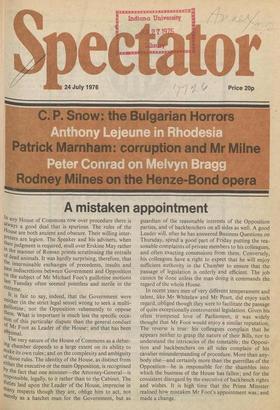A mistaken appointment
In any House of Commons row over procedure there is alWays a good deal that is spurious. The rules of the House are both ancient and obscure. Their willing interpreters are legion. The Speaker and his advisers, when their judgment is required, mull over Erskine May rather ln the manner of Roman priests scrutinising the entrails of dead animals. It was hardly surprising, therefore, that the interminable exchanges of precedents, insults and Past indiscretions between Government and Opposition ? n the subject of Mr Michael Foot's guillotine motions last Tuesday often seemed pointless and sterile in the extreme.
It is fair to say, indeed, that the Government were neither (in the strict legal sense) wrong to seek a multiguillotine; nor the Opposition vehemently to oppose hemrn. What is important is much less the specific occasion of this particular dispute than the general conduct Of Mr Foot as Leader of the House; and that has been abYsmal.
• The very nature of the House of Commons as a debating chamber depends to a large extent on its ability to Make its own rules; and on the complexity and ambiguity Of those rules. The identity of the House, as distinct from "ither the executive or the main Opposition, is recognised 1°Y the fact that one minister—the Attorney-General—is responsible, legally, to it rather than to the Cabinet. The duties laid upon the Leader of the House, imprecise in many respects though they are, oblige him to act, not Merely as a hatchet man for the Government, but as guardian of the reasonable interests of the Opposition parties, and of backbenchers on all sides as well. A good Leader will, after he has answered Business Questions on Thursday, spend a good part of Friday putting the reasonable complaints of private Members to his colleagues, and often exacting concessions from them. Conversely, his colleagues have a right to expect that he will enjoy sufficient authority in the Chamber to ensure that the passage of legislation is orderly and efficient. The job cannot be done unless the man doing it commands the regard of the whole House.
In recent years men of very different temperament and talent, like Mr Whitelaw and Mr Peart, did enjoy such regard, obliged though they were to facilitate the passage of quite exceptionally controversial legislation. Given his often trumpeted love of Parliament, it was widely thought that Mr Foot would enjoy a similar reputation. The reverse is true : his colleagues complain that he appears neither to grasp the nature of their Bills, nor to understand the intricacies of the timetable; the Opposition and backbenchers on all sides complain of his cavalier misunderstanding of procedure. More than anybody else—and certainly more than the guerrillas of the Opposition—he is responsible for the shambles into which the business of the House has fallen ; and for the consistent disregard by the executive of backbench rights and wishes. It is high time that the Prime Minister realised how mistaken Mr Foot's appointment was; and made a change.


































